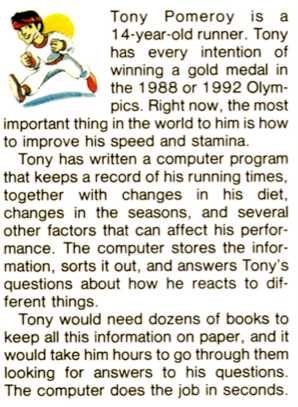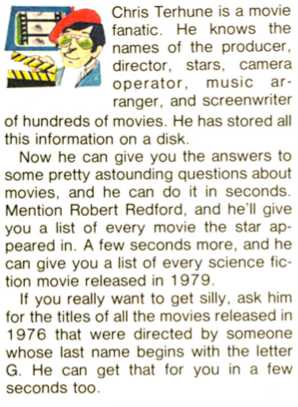I’m having a lot of “lemonade moments” (um, that means finding the good in a less than optimal situation, not wetting myself) this week going through a bunch of stuff from my mom’s basement (every technologist who goes on and on about “near-infinite, near-zero cost storage in the cloud” probably has a few boxes stored away at his or her parent’s, and this needs to be considered at some point, if not in this post.)
Lots of old computer magazines, circa 1983 or so, many of which are now available online (so yes, thank you, near-infinite storage) but somehow that made things worse and I ended up looking up more junk while disposing of what I had. One gem was Blip, the Video Games Magazine, published by Marvel Comics in 1983. Big fonts, lots of filler, 36 pages, $1.00 US/$1.25CA. Lasted 7 issues before folding, but kind of fun, in retrospect.
Here’s a snippet from issue 4’s always popular “consoles are going to turn into computers” article:
 Now, a quick-yet-lazy search on Google doesn’t show any evidence that Tony achieved his dream, but I like this entry because it doesn’t involve balancing your checkbook (remember those?) but still highlights the desperate need for early hobbyists to find something to fill the “but what can you do with it?” question that, let’s be honest, most of us had a hard time answering with something other than “games.”
Now, a quick-yet-lazy search on Google doesn’t show any evidence that Tony achieved his dream, but I like this entry because it doesn’t involve balancing your checkbook (remember those?) but still highlights the desperate need for early hobbyists to find something to fill the “but what can you do with it?” question that, let’s be honest, most of us had a hard time answering with something other than “games.”
In a lot of ways, I’m seeing social media of modern times approach computer rationalization of the early ’80s. It’s passing, slowly, but there are still a horde of mid-stage adopters who are still looking for something to justify their use of Twitter, FourSquare, etc. Just like those days, there’s a layering in progress that almost mirrors applications over hardware – without social networks, things like the mobile/social coupon thing we talked about the other week would just be coupons, for example.
And this isn’t a new observation by any means. Still, I’d love to see an elevator pitch that really took this concept to heart and went along the lines of “we make it so people have an excuse to use X.”
Oh, and I’ve yet to see a running website that hits what Tony was after, exactly (please let me know if you’ve got one,) but I thought this part from the same Blip article was worthy of comment:
 Seven years later, the scripts that would form the basis of IMDB were born. No mention of Chris, but for some people, in the early days of the internet, IMDB was almost a justification for internet access in itself.
Seven years later, the scripts that would form the basis of IMDB were born. No mention of Chris, but for some people, in the early days of the internet, IMDB was almost a justification for internet access in itself.
Leave a Reply